Case Study Analysis: Ethical Dilemmas in Business (Nike & KFC)
VerifiedAdded on 2021/04/21
|14
|3662
|47
Case Study
AI Summary
This assignment is a case study analyzing the ethical dilemmas and corporate wrongdoings of two multinational corporations: Nike and Kentucky Fried Chicken (KFC). The study examines the ethical issues related to Nike's labor practices, including the use of sweatshops and child labor, as well as the company's ethical dilemmas regarding outsourcing and promotional spending. It also explores the ethical concerns surrounding KFC's operations. The assignment applies business ethics theories, such as social group perspective, egoism, and utilitarianism, to understand the companies' actions. It identifies ethical dilemmas and provides recommendations for improved ethical behavior, emphasizing the importance of an inclusive corporate culture, employee empowerment, and corporate social responsibility. The study aims to provide a comprehensive analysis of the ethical considerations in business operations and decision-making.
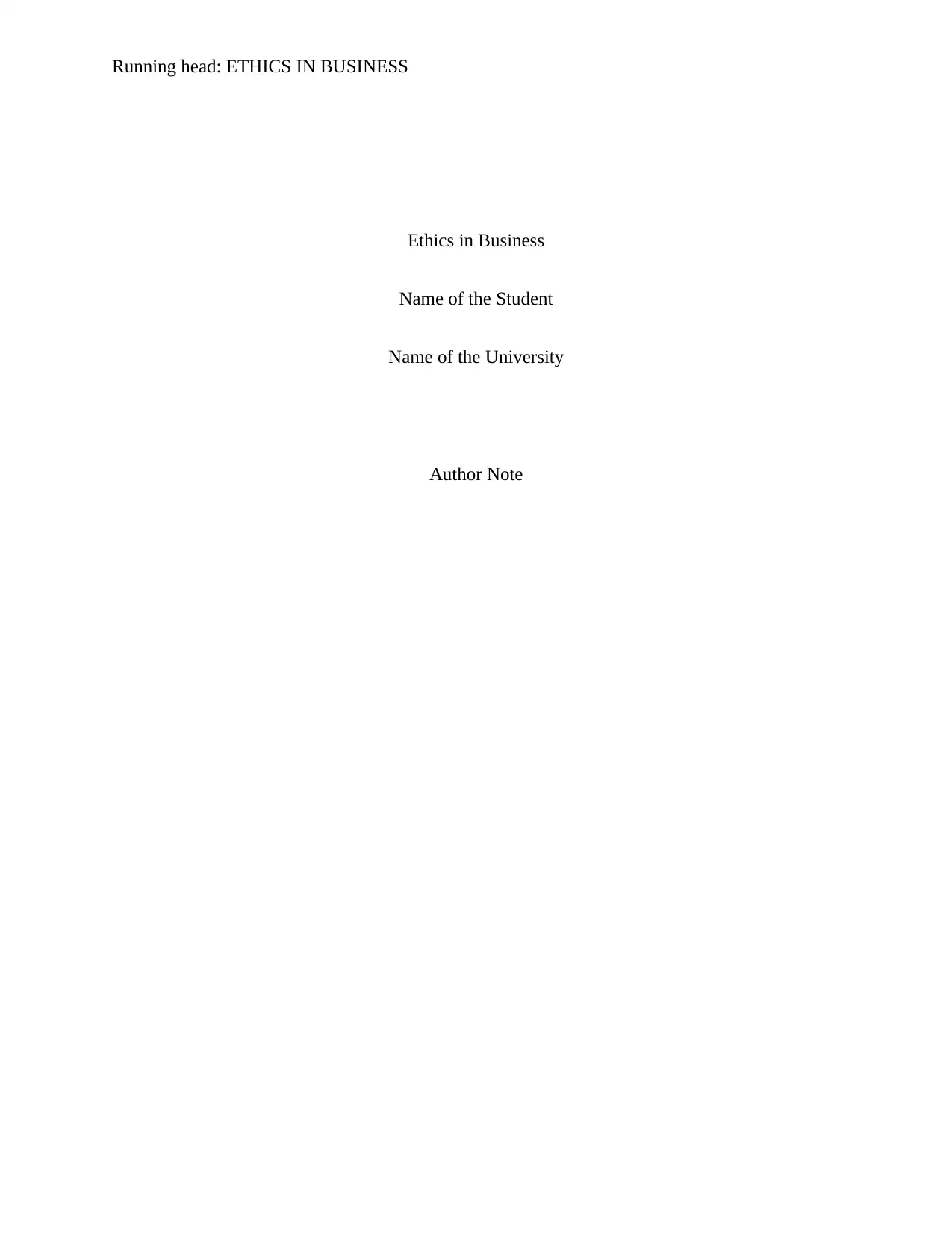
Running head: ETHICS IN BUSINESS
Ethics in Business
Name of the Student
Name of the University
Author Note
Ethics in Business
Name of the Student
Name of the University
Author Note
Paraphrase This Document
Need a fresh take? Get an instant paraphrase of this document with our AI Paraphraser
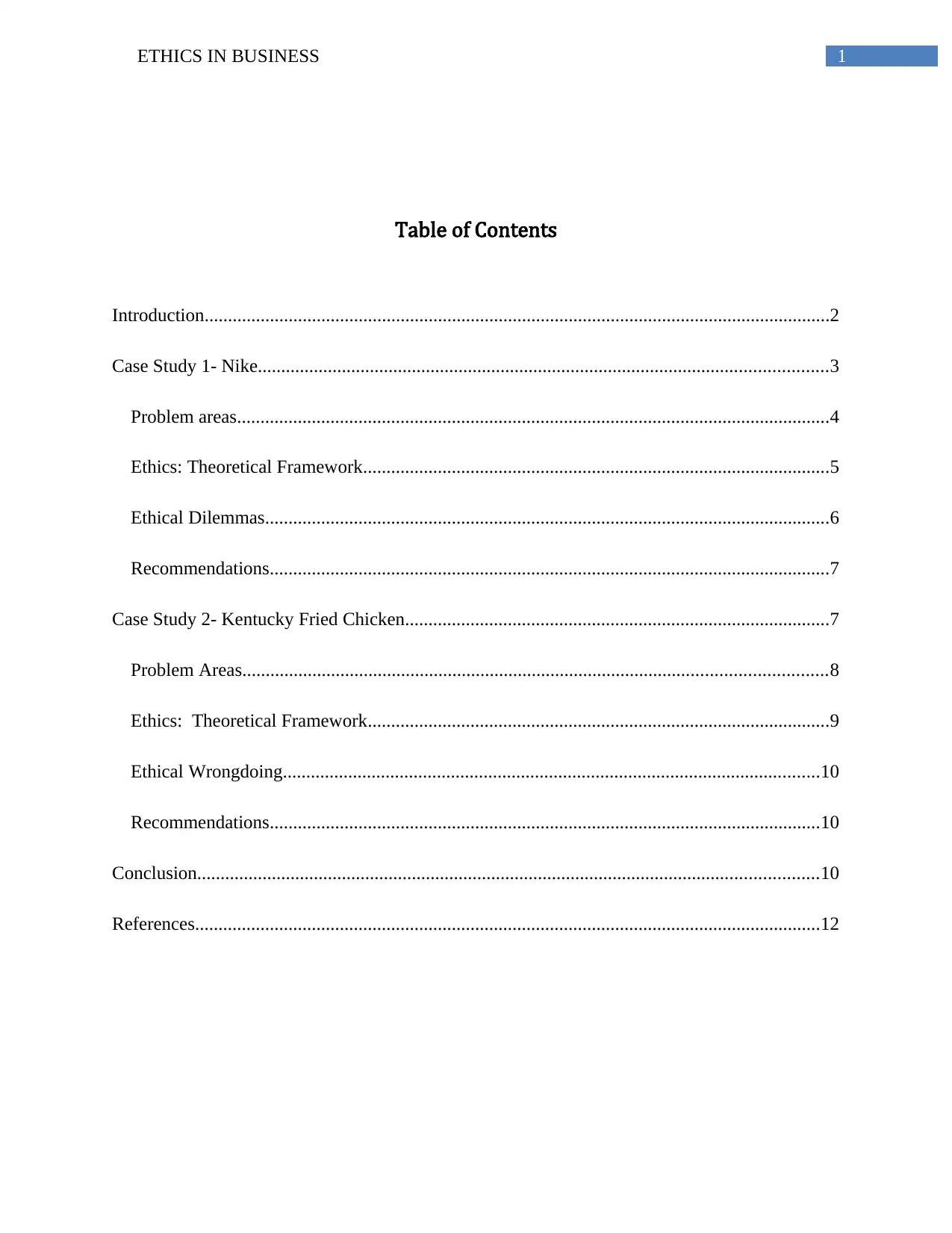
1ETHICS IN BUSINESS
Table of Contents
Introduction......................................................................................................................................2
Case Study 1- Nike..........................................................................................................................3
Problem areas...............................................................................................................................4
Ethics: Theoretical Framework....................................................................................................5
Ethical Dilemmas.........................................................................................................................6
Recommendations........................................................................................................................7
Case Study 2- Kentucky Fried Chicken...........................................................................................7
Problem Areas.............................................................................................................................8
Ethics: Theoretical Framework...................................................................................................9
Ethical Wrongdoing...................................................................................................................10
Recommendations......................................................................................................................10
Conclusion.....................................................................................................................................10
References......................................................................................................................................12
Table of Contents
Introduction......................................................................................................................................2
Case Study 1- Nike..........................................................................................................................3
Problem areas...............................................................................................................................4
Ethics: Theoretical Framework....................................................................................................5
Ethical Dilemmas.........................................................................................................................6
Recommendations........................................................................................................................7
Case Study 2- Kentucky Fried Chicken...........................................................................................7
Problem Areas.............................................................................................................................8
Ethics: Theoretical Framework...................................................................................................9
Ethical Wrongdoing...................................................................................................................10
Recommendations......................................................................................................................10
Conclusion.....................................................................................................................................10
References......................................................................................................................................12
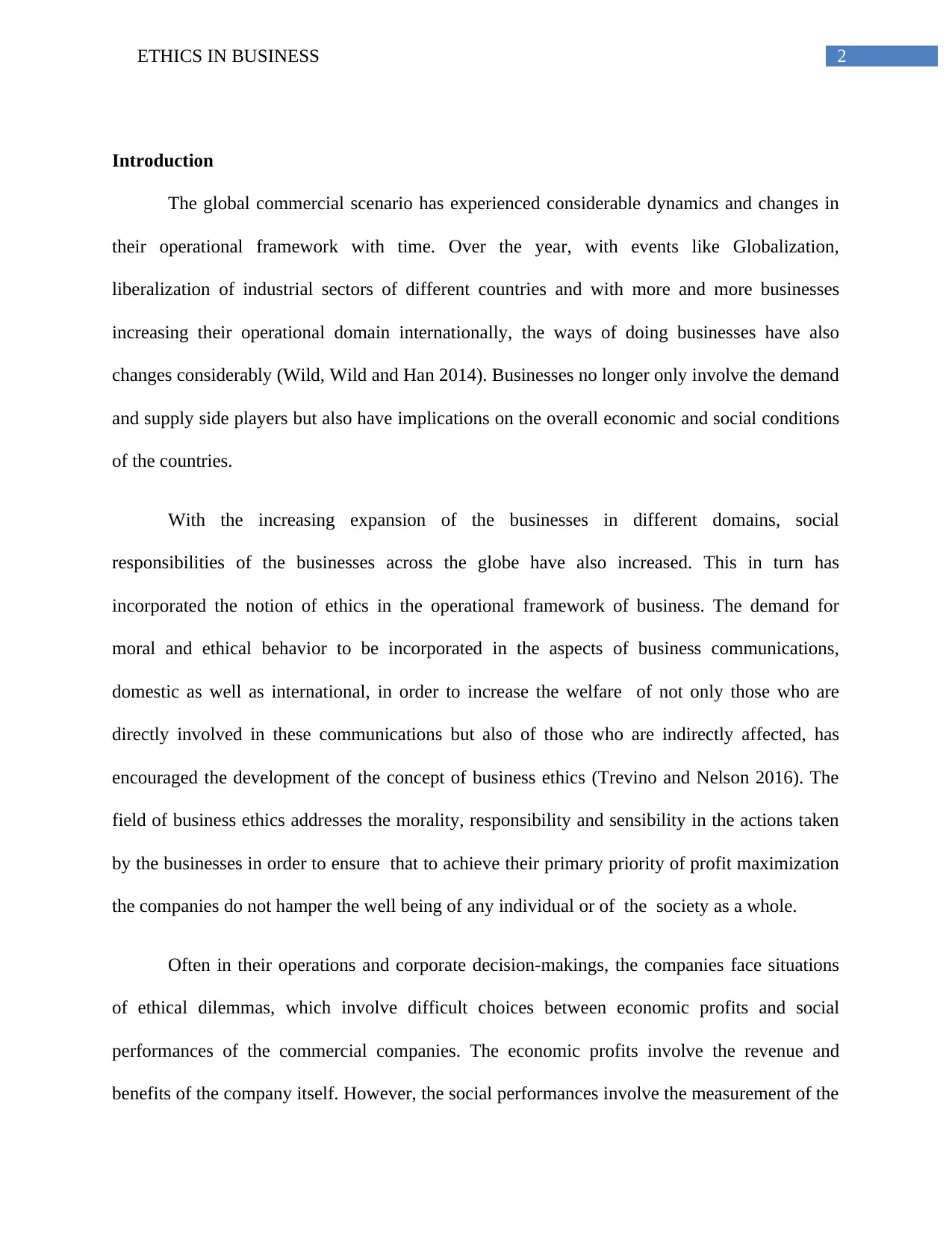
2ETHICS IN BUSINESS
Introduction
The global commercial scenario has experienced considerable dynamics and changes in
their operational framework with time. Over the year, with events like Globalization,
liberalization of industrial sectors of different countries and with more and more businesses
increasing their operational domain internationally, the ways of doing businesses have also
changes considerably (Wild, Wild and Han 2014). Businesses no longer only involve the demand
and supply side players but also have implications on the overall economic and social conditions
of the countries.
With the increasing expansion of the businesses in different domains, social
responsibilities of the businesses across the globe have also increased. This in turn has
incorporated the notion of ethics in the operational framework of business. The demand for
moral and ethical behavior to be incorporated in the aspects of business communications,
domestic as well as international, in order to increase the welfare of not only those who are
directly involved in these communications but also of those who are indirectly affected, has
encouraged the development of the concept of business ethics (Trevino and Nelson 2016). The
field of business ethics addresses the morality, responsibility and sensibility in the actions taken
by the businesses in order to ensure that to achieve their primary priority of profit maximization
the companies do not hamper the well being of any individual or of the society as a whole.
Often in their operations and corporate decision-makings, the companies face situations
of ethical dilemmas, which involve difficult choices between economic profits and social
performances of the commercial companies. The economic profits involve the revenue and
benefits of the company itself. However, the social performances involve the measurement of the
Introduction
The global commercial scenario has experienced considerable dynamics and changes in
their operational framework with time. Over the year, with events like Globalization,
liberalization of industrial sectors of different countries and with more and more businesses
increasing their operational domain internationally, the ways of doing businesses have also
changes considerably (Wild, Wild and Han 2014). Businesses no longer only involve the demand
and supply side players but also have implications on the overall economic and social conditions
of the countries.
With the increasing expansion of the businesses in different domains, social
responsibilities of the businesses across the globe have also increased. This in turn has
incorporated the notion of ethics in the operational framework of business. The demand for
moral and ethical behavior to be incorporated in the aspects of business communications,
domestic as well as international, in order to increase the welfare of not only those who are
directly involved in these communications but also of those who are indirectly affected, has
encouraged the development of the concept of business ethics (Trevino and Nelson 2016). The
field of business ethics addresses the morality, responsibility and sensibility in the actions taken
by the businesses in order to ensure that to achieve their primary priority of profit maximization
the companies do not hamper the well being of any individual or of the society as a whole.
Often in their operations and corporate decision-makings, the companies face situations
of ethical dilemmas, which involve difficult choices between economic profits and social
performances of the commercial companies. The economic profits involve the revenue and
benefits of the company itself. However, the social performances involve the measurement of the
⊘ This is a preview!⊘
Do you want full access?
Subscribe today to unlock all pages.

Trusted by 1+ million students worldwide
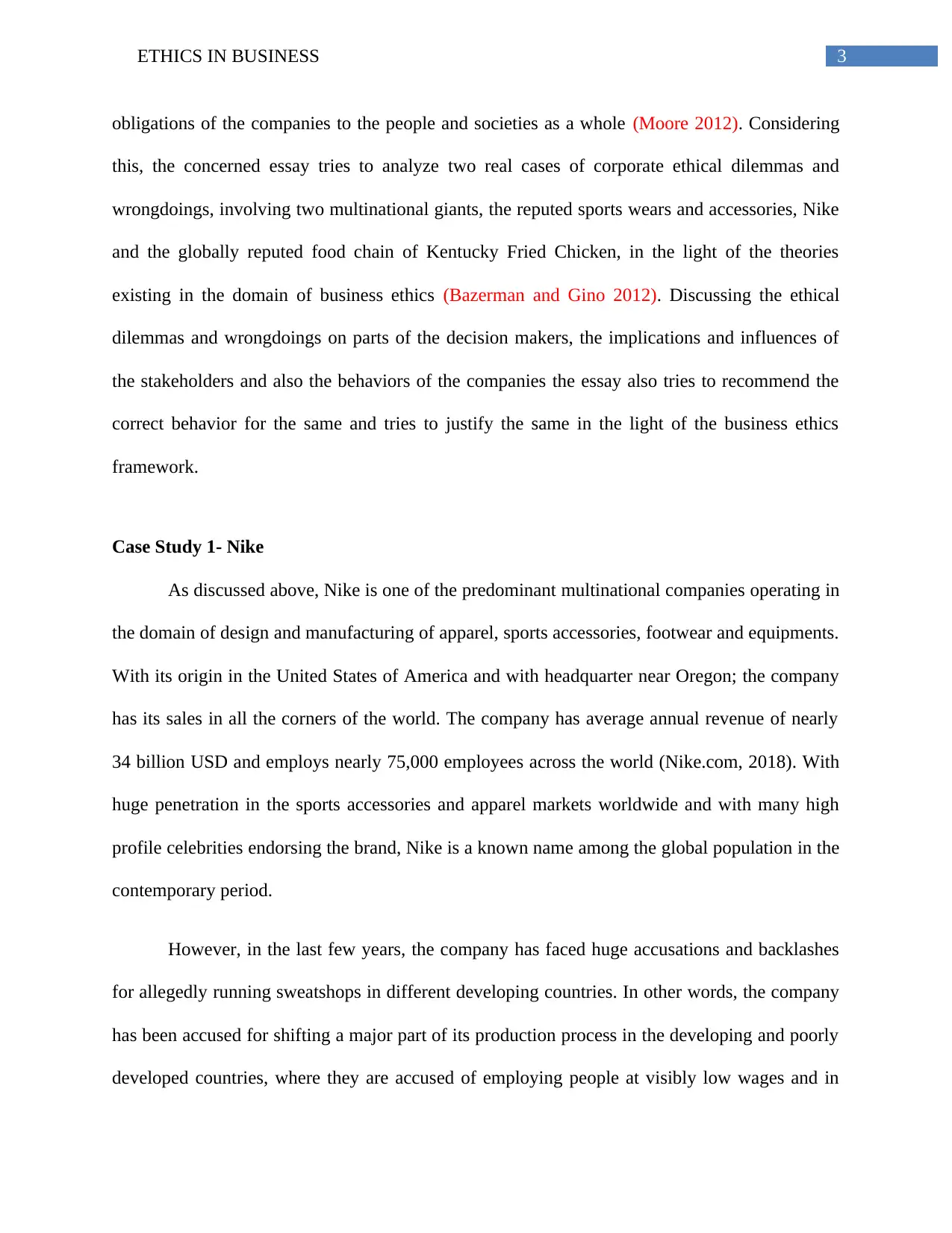
3ETHICS IN BUSINESS
obligations of the companies to the people and societies as a whole (Moore 2012). Considering
this, the concerned essay tries to analyze two real cases of corporate ethical dilemmas and
wrongdoings, involving two multinational giants, the reputed sports wears and accessories, Nike
and the globally reputed food chain of Kentucky Fried Chicken, in the light of the theories
existing in the domain of business ethics (Bazerman and Gino 2012). Discussing the ethical
dilemmas and wrongdoings on parts of the decision makers, the implications and influences of
the stakeholders and also the behaviors of the companies the essay also tries to recommend the
correct behavior for the same and tries to justify the same in the light of the business ethics
framework.
Case Study 1- Nike
As discussed above, Nike is one of the predominant multinational companies operating in
the domain of design and manufacturing of apparel, sports accessories, footwear and equipments.
With its origin in the United States of America and with headquarter near Oregon; the company
has its sales in all the corners of the world. The company has average annual revenue of nearly
34 billion USD and employs nearly 75,000 employees across the world (Nike.com, 2018). With
huge penetration in the sports accessories and apparel markets worldwide and with many high
profile celebrities endorsing the brand, Nike is a known name among the global population in the
contemporary period.
However, in the last few years, the company has faced huge accusations and backlashes
for allegedly running sweatshops in different developing countries. In other words, the company
has been accused for shifting a major part of its production process in the developing and poorly
developed countries, where they are accused of employing people at visibly low wages and in
obligations of the companies to the people and societies as a whole (Moore 2012). Considering
this, the concerned essay tries to analyze two real cases of corporate ethical dilemmas and
wrongdoings, involving two multinational giants, the reputed sports wears and accessories, Nike
and the globally reputed food chain of Kentucky Fried Chicken, in the light of the theories
existing in the domain of business ethics (Bazerman and Gino 2012). Discussing the ethical
dilemmas and wrongdoings on parts of the decision makers, the implications and influences of
the stakeholders and also the behaviors of the companies the essay also tries to recommend the
correct behavior for the same and tries to justify the same in the light of the business ethics
framework.
Case Study 1- Nike
As discussed above, Nike is one of the predominant multinational companies operating in
the domain of design and manufacturing of apparel, sports accessories, footwear and equipments.
With its origin in the United States of America and with headquarter near Oregon; the company
has its sales in all the corners of the world. The company has average annual revenue of nearly
34 billion USD and employs nearly 75,000 employees across the world (Nike.com, 2018). With
huge penetration in the sports accessories and apparel markets worldwide and with many high
profile celebrities endorsing the brand, Nike is a known name among the global population in the
contemporary period.
However, in the last few years, the company has faced huge accusations and backlashes
for allegedly running sweatshops in different developing countries. In other words, the company
has been accused for shifting a major part of its production process in the developing and poorly
developed countries, where they are accused of employing people at visibly low wages and in
Paraphrase This Document
Need a fresh take? Get an instant paraphrase of this document with our AI Paraphraser
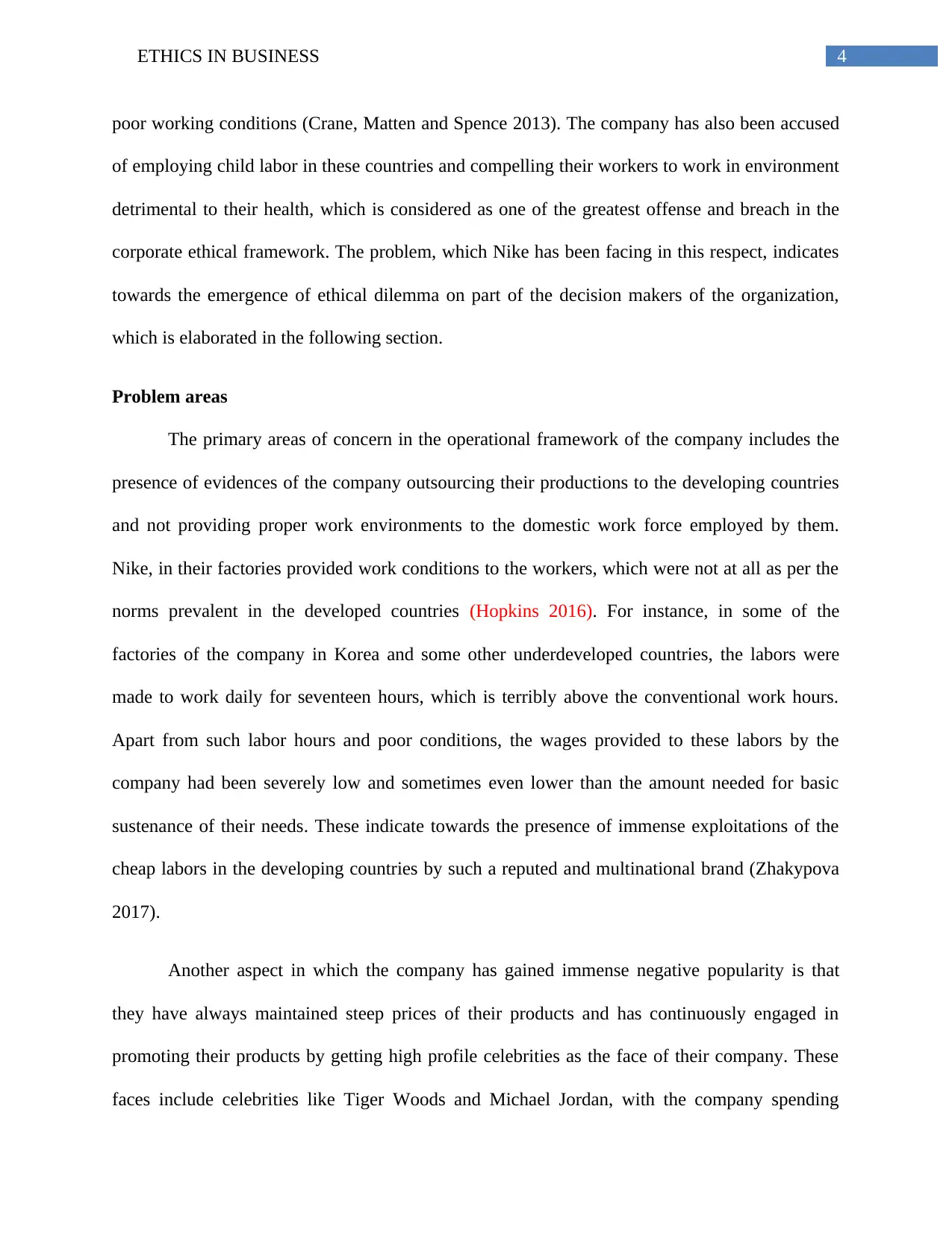
4ETHICS IN BUSINESS
poor working conditions (Crane, Matten and Spence 2013). The company has also been accused
of employing child labor in these countries and compelling their workers to work in environment
detrimental to their health, which is considered as one of the greatest offense and breach in the
corporate ethical framework. The problem, which Nike has been facing in this respect, indicates
towards the emergence of ethical dilemma on part of the decision makers of the organization,
which is elaborated in the following section.
Problem areas
The primary areas of concern in the operational framework of the company includes the
presence of evidences of the company outsourcing their productions to the developing countries
and not providing proper work environments to the domestic work force employed by them.
Nike, in their factories provided work conditions to the workers, which were not at all as per the
norms prevalent in the developed countries (Hopkins 2016). For instance, in some of the
factories of the company in Korea and some other underdeveloped countries, the labors were
made to work daily for seventeen hours, which is terribly above the conventional work hours.
Apart from such labor hours and poor conditions, the wages provided to these labors by the
company had been severely low and sometimes even lower than the amount needed for basic
sustenance of their needs. These indicate towards the presence of immense exploitations of the
cheap labors in the developing countries by such a reputed and multinational brand (Zhakypova
2017).
Another aspect in which the company has gained immense negative popularity is that
they have always maintained steep prices of their products and has continuously engaged in
promoting their products by getting high profile celebrities as the face of their company. These
faces include celebrities like Tiger Woods and Michael Jordan, with the company spending
poor working conditions (Crane, Matten and Spence 2013). The company has also been accused
of employing child labor in these countries and compelling their workers to work in environment
detrimental to their health, which is considered as one of the greatest offense and breach in the
corporate ethical framework. The problem, which Nike has been facing in this respect, indicates
towards the emergence of ethical dilemma on part of the decision makers of the organization,
which is elaborated in the following section.
Problem areas
The primary areas of concern in the operational framework of the company includes the
presence of evidences of the company outsourcing their productions to the developing countries
and not providing proper work environments to the domestic work force employed by them.
Nike, in their factories provided work conditions to the workers, which were not at all as per the
norms prevalent in the developed countries (Hopkins 2016). For instance, in some of the
factories of the company in Korea and some other underdeveloped countries, the labors were
made to work daily for seventeen hours, which is terribly above the conventional work hours.
Apart from such labor hours and poor conditions, the wages provided to these labors by the
company had been severely low and sometimes even lower than the amount needed for basic
sustenance of their needs. These indicate towards the presence of immense exploitations of the
cheap labors in the developing countries by such a reputed and multinational brand (Zhakypova
2017).
Another aspect in which the company has gained immense negative popularity is that
they have always maintained steep prices of their products and has continuously engaged in
promoting their products by getting high profile celebrities as the face of their company. These
faces include celebrities like Tiger Woods and Michael Jordan, with the company spending
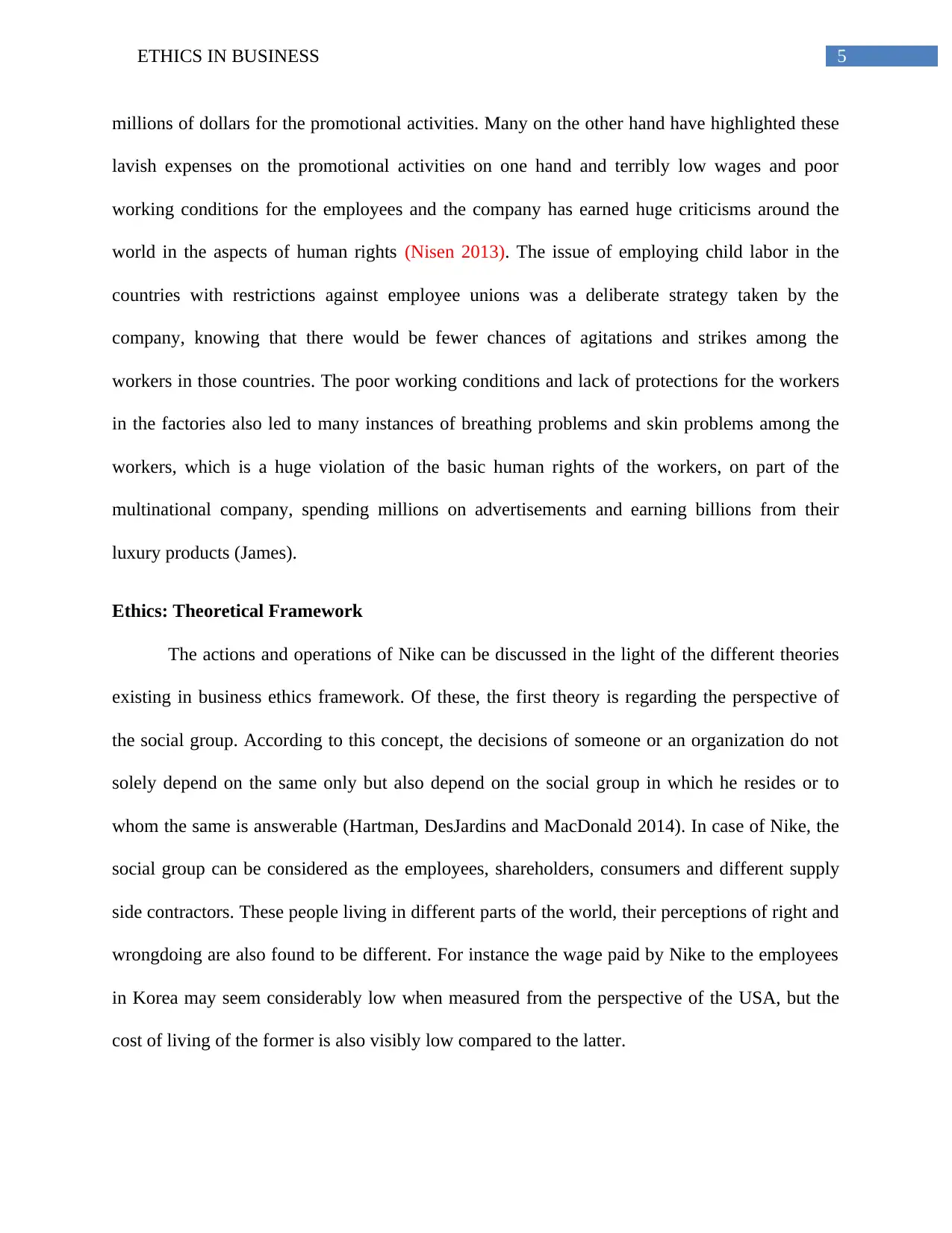
5ETHICS IN BUSINESS
millions of dollars for the promotional activities. Many on the other hand have highlighted these
lavish expenses on the promotional activities on one hand and terribly low wages and poor
working conditions for the employees and the company has earned huge criticisms around the
world in the aspects of human rights (Nisen 2013). The issue of employing child labor in the
countries with restrictions against employee unions was a deliberate strategy taken by the
company, knowing that there would be fewer chances of agitations and strikes among the
workers in those countries. The poor working conditions and lack of protections for the workers
in the factories also led to many instances of breathing problems and skin problems among the
workers, which is a huge violation of the basic human rights of the workers, on part of the
multinational company, spending millions on advertisements and earning billions from their
luxury products (James).
Ethics: Theoretical Framework
The actions and operations of Nike can be discussed in the light of the different theories
existing in business ethics framework. Of these, the first theory is regarding the perspective of
the social group. According to this concept, the decisions of someone or an organization do not
solely depend on the same only but also depend on the social group in which he resides or to
whom the same is answerable (Hartman, DesJardins and MacDonald 2014). In case of Nike, the
social group can be considered as the employees, shareholders, consumers and different supply
side contractors. These people living in different parts of the world, their perceptions of right and
wrongdoing are also found to be different. For instance the wage paid by Nike to the employees
in Korea may seem considerably low when measured from the perspective of the USA, but the
cost of living of the former is also visibly low compared to the latter.
millions of dollars for the promotional activities. Many on the other hand have highlighted these
lavish expenses on the promotional activities on one hand and terribly low wages and poor
working conditions for the employees and the company has earned huge criticisms around the
world in the aspects of human rights (Nisen 2013). The issue of employing child labor in the
countries with restrictions against employee unions was a deliberate strategy taken by the
company, knowing that there would be fewer chances of agitations and strikes among the
workers in those countries. The poor working conditions and lack of protections for the workers
in the factories also led to many instances of breathing problems and skin problems among the
workers, which is a huge violation of the basic human rights of the workers, on part of the
multinational company, spending millions on advertisements and earning billions from their
luxury products (James).
Ethics: Theoretical Framework
The actions and operations of Nike can be discussed in the light of the different theories
existing in business ethics framework. Of these, the first theory is regarding the perspective of
the social group. According to this concept, the decisions of someone or an organization do not
solely depend on the same only but also depend on the social group in which he resides or to
whom the same is answerable (Hartman, DesJardins and MacDonald 2014). In case of Nike, the
social group can be considered as the employees, shareholders, consumers and different supply
side contractors. These people living in different parts of the world, their perceptions of right and
wrongdoing are also found to be different. For instance the wage paid by Nike to the employees
in Korea may seem considerably low when measured from the perspective of the USA, but the
cost of living of the former is also visibly low compared to the latter.
⊘ This is a preview!⊘
Do you want full access?
Subscribe today to unlock all pages.

Trusted by 1+ million students worldwide
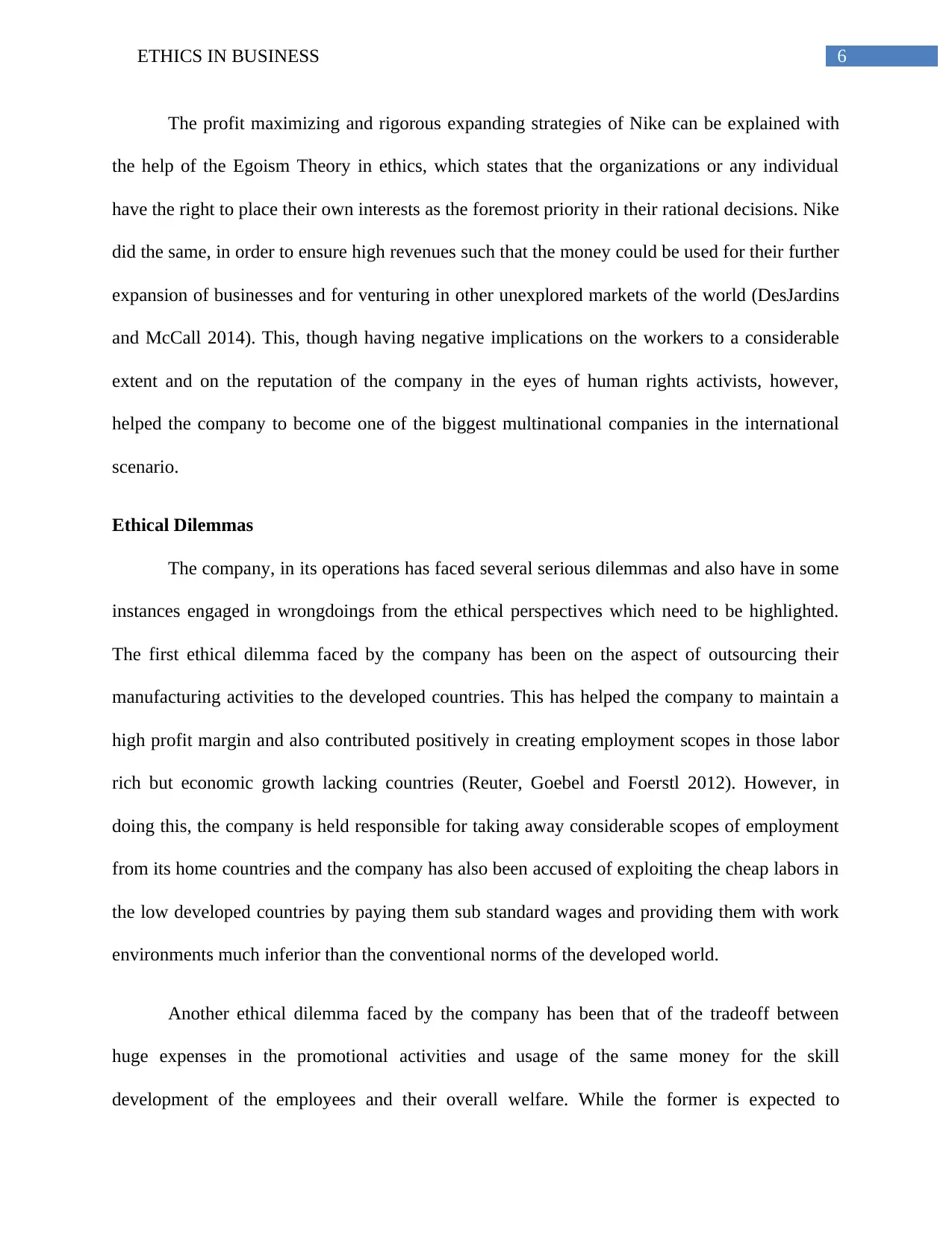
6ETHICS IN BUSINESS
The profit maximizing and rigorous expanding strategies of Nike can be explained with
the help of the Egoism Theory in ethics, which states that the organizations or any individual
have the right to place their own interests as the foremost priority in their rational decisions. Nike
did the same, in order to ensure high revenues such that the money could be used for their further
expansion of businesses and for venturing in other unexplored markets of the world (DesJardins
and McCall 2014). This, though having negative implications on the workers to a considerable
extent and on the reputation of the company in the eyes of human rights activists, however,
helped the company to become one of the biggest multinational companies in the international
scenario.
Ethical Dilemmas
The company, in its operations has faced several serious dilemmas and also have in some
instances engaged in wrongdoings from the ethical perspectives which need to be highlighted.
The first ethical dilemma faced by the company has been on the aspect of outsourcing their
manufacturing activities to the developed countries. This has helped the company to maintain a
high profit margin and also contributed positively in creating employment scopes in those labor
rich but economic growth lacking countries (Reuter, Goebel and Foerstl 2012). However, in
doing this, the company is held responsible for taking away considerable scopes of employment
from its home countries and the company has also been accused of exploiting the cheap labors in
the low developed countries by paying them sub standard wages and providing them with work
environments much inferior than the conventional norms of the developed world.
Another ethical dilemma faced by the company has been that of the tradeoff between
huge expenses in the promotional activities and usage of the same money for the skill
development of the employees and their overall welfare. While the former is expected to
The profit maximizing and rigorous expanding strategies of Nike can be explained with
the help of the Egoism Theory in ethics, which states that the organizations or any individual
have the right to place their own interests as the foremost priority in their rational decisions. Nike
did the same, in order to ensure high revenues such that the money could be used for their further
expansion of businesses and for venturing in other unexplored markets of the world (DesJardins
and McCall 2014). This, though having negative implications on the workers to a considerable
extent and on the reputation of the company in the eyes of human rights activists, however,
helped the company to become one of the biggest multinational companies in the international
scenario.
Ethical Dilemmas
The company, in its operations has faced several serious dilemmas and also have in some
instances engaged in wrongdoings from the ethical perspectives which need to be highlighted.
The first ethical dilemma faced by the company has been on the aspect of outsourcing their
manufacturing activities to the developed countries. This has helped the company to maintain a
high profit margin and also contributed positively in creating employment scopes in those labor
rich but economic growth lacking countries (Reuter, Goebel and Foerstl 2012). However, in
doing this, the company is held responsible for taking away considerable scopes of employment
from its home countries and the company has also been accused of exploiting the cheap labors in
the low developed countries by paying them sub standard wages and providing them with work
environments much inferior than the conventional norms of the developed world.
Another ethical dilemma faced by the company has been that of the tradeoff between
huge expenses in the promotional activities and usage of the same money for the skill
development of the employees and their overall welfare. While the former is expected to
Paraphrase This Document
Need a fresh take? Get an instant paraphrase of this document with our AI Paraphraser
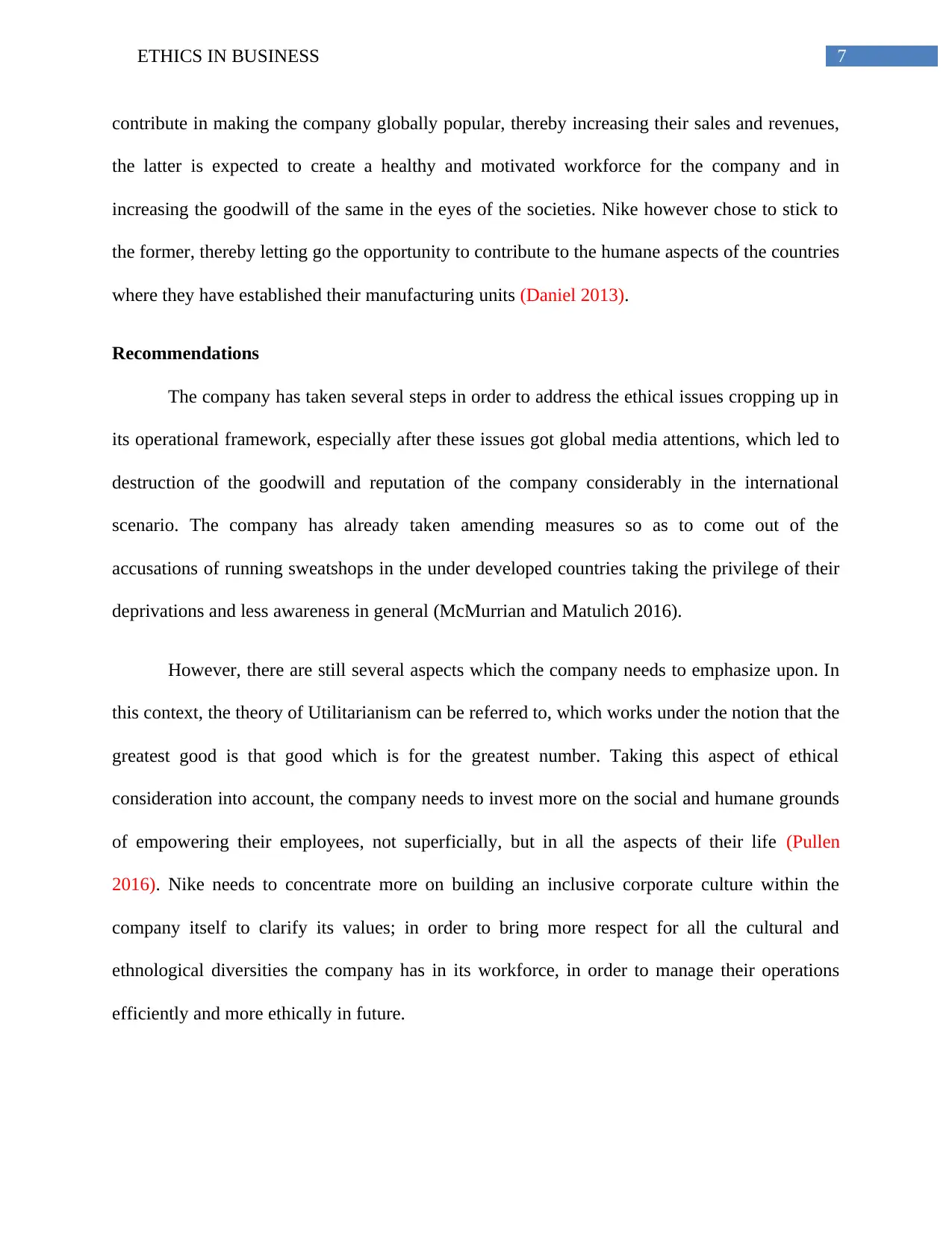
7ETHICS IN BUSINESS
contribute in making the company globally popular, thereby increasing their sales and revenues,
the latter is expected to create a healthy and motivated workforce for the company and in
increasing the goodwill of the same in the eyes of the societies. Nike however chose to stick to
the former, thereby letting go the opportunity to contribute to the humane aspects of the countries
where they have established their manufacturing units (Daniel 2013).
Recommendations
The company has taken several steps in order to address the ethical issues cropping up in
its operational framework, especially after these issues got global media attentions, which led to
destruction of the goodwill and reputation of the company considerably in the international
scenario. The company has already taken amending measures so as to come out of the
accusations of running sweatshops in the under developed countries taking the privilege of their
deprivations and less awareness in general (McMurrian and Matulich 2016).
However, there are still several aspects which the company needs to emphasize upon. In
this context, the theory of Utilitarianism can be referred to, which works under the notion that the
greatest good is that good which is for the greatest number. Taking this aspect of ethical
consideration into account, the company needs to invest more on the social and humane grounds
of empowering their employees, not superficially, but in all the aspects of their life (Pullen
2016). Nike needs to concentrate more on building an inclusive corporate culture within the
company itself to clarify its values; in order to bring more respect for all the cultural and
ethnological diversities the company has in its workforce, in order to manage their operations
efficiently and more ethically in future.
contribute in making the company globally popular, thereby increasing their sales and revenues,
the latter is expected to create a healthy and motivated workforce for the company and in
increasing the goodwill of the same in the eyes of the societies. Nike however chose to stick to
the former, thereby letting go the opportunity to contribute to the humane aspects of the countries
where they have established their manufacturing units (Daniel 2013).
Recommendations
The company has taken several steps in order to address the ethical issues cropping up in
its operational framework, especially after these issues got global media attentions, which led to
destruction of the goodwill and reputation of the company considerably in the international
scenario. The company has already taken amending measures so as to come out of the
accusations of running sweatshops in the under developed countries taking the privilege of their
deprivations and less awareness in general (McMurrian and Matulich 2016).
However, there are still several aspects which the company needs to emphasize upon. In
this context, the theory of Utilitarianism can be referred to, which works under the notion that the
greatest good is that good which is for the greatest number. Taking this aspect of ethical
consideration into account, the company needs to invest more on the social and humane grounds
of empowering their employees, not superficially, but in all the aspects of their life (Pullen
2016). Nike needs to concentrate more on building an inclusive corporate culture within the
company itself to clarify its values; in order to bring more respect for all the cultural and
ethnological diversities the company has in its workforce, in order to manage their operations
efficiently and more ethically in future.
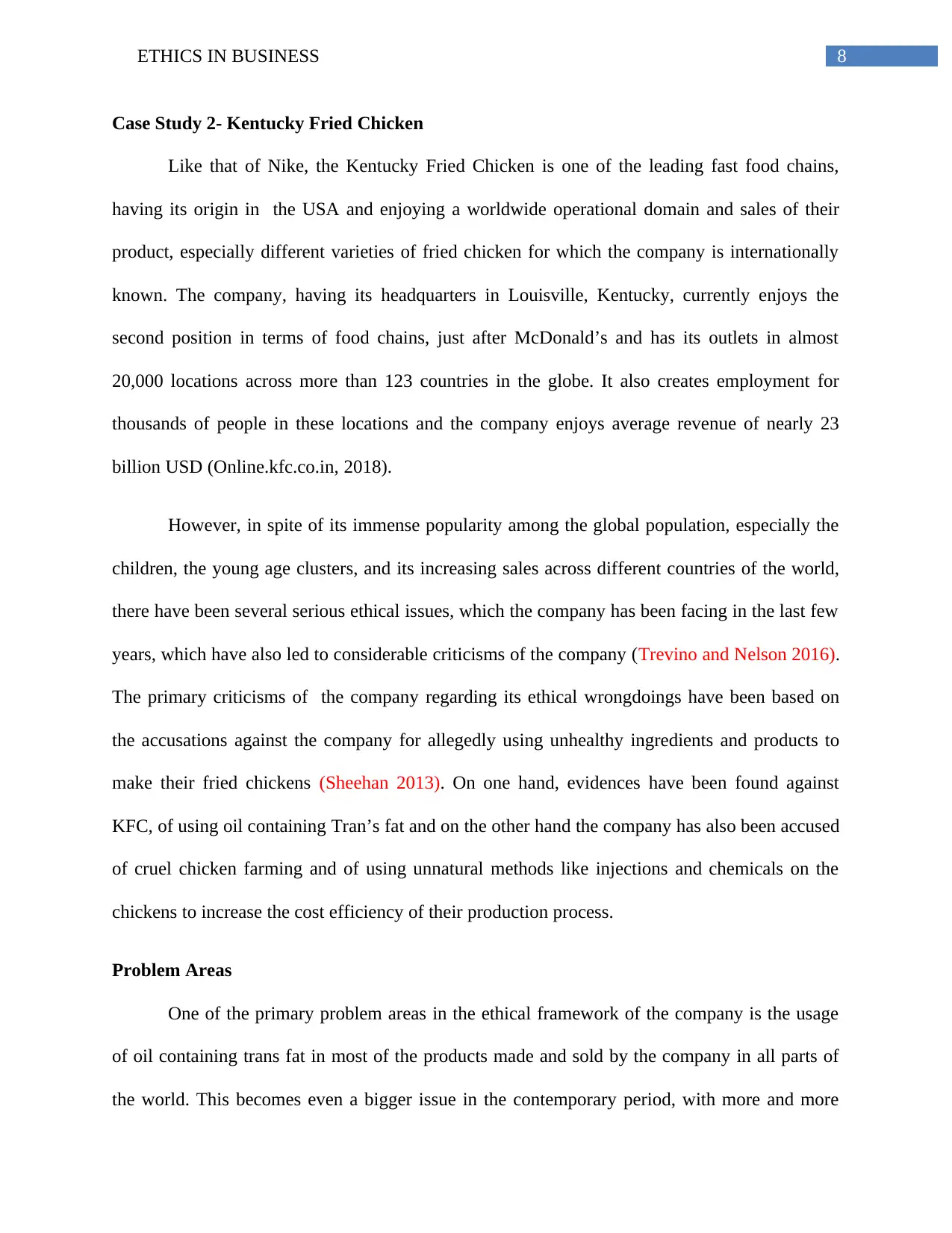
8ETHICS IN BUSINESS
Case Study 2- Kentucky Fried Chicken
Like that of Nike, the Kentucky Fried Chicken is one of the leading fast food chains,
having its origin in the USA and enjoying a worldwide operational domain and sales of their
product, especially different varieties of fried chicken for which the company is internationally
known. The company, having its headquarters in Louisville, Kentucky, currently enjoys the
second position in terms of food chains, just after McDonald’s and has its outlets in almost
20,000 locations across more than 123 countries in the globe. It also creates employment for
thousands of people in these locations and the company enjoys average revenue of nearly 23
billion USD (Online.kfc.co.in, 2018).
However, in spite of its immense popularity among the global population, especially the
children, the young age clusters, and its increasing sales across different countries of the world,
there have been several serious ethical issues, which the company has been facing in the last few
years, which have also led to considerable criticisms of the company (Trevino and Nelson 2016).
The primary criticisms of the company regarding its ethical wrongdoings have been based on
the accusations against the company for allegedly using unhealthy ingredients and products to
make their fried chickens (Sheehan 2013). On one hand, evidences have been found against
KFC, of using oil containing Tran’s fat and on the other hand the company has also been accused
of cruel chicken farming and of using unnatural methods like injections and chemicals on the
chickens to increase the cost efficiency of their production process.
Problem Areas
One of the primary problem areas in the ethical framework of the company is the usage
of oil containing trans fat in most of the products made and sold by the company in all parts of
the world. This becomes even a bigger issue in the contemporary period, with more and more
Case Study 2- Kentucky Fried Chicken
Like that of Nike, the Kentucky Fried Chicken is one of the leading fast food chains,
having its origin in the USA and enjoying a worldwide operational domain and sales of their
product, especially different varieties of fried chicken for which the company is internationally
known. The company, having its headquarters in Louisville, Kentucky, currently enjoys the
second position in terms of food chains, just after McDonald’s and has its outlets in almost
20,000 locations across more than 123 countries in the globe. It also creates employment for
thousands of people in these locations and the company enjoys average revenue of nearly 23
billion USD (Online.kfc.co.in, 2018).
However, in spite of its immense popularity among the global population, especially the
children, the young age clusters, and its increasing sales across different countries of the world,
there have been several serious ethical issues, which the company has been facing in the last few
years, which have also led to considerable criticisms of the company (Trevino and Nelson 2016).
The primary criticisms of the company regarding its ethical wrongdoings have been based on
the accusations against the company for allegedly using unhealthy ingredients and products to
make their fried chickens (Sheehan 2013). On one hand, evidences have been found against
KFC, of using oil containing Tran’s fat and on the other hand the company has also been accused
of cruel chicken farming and of using unnatural methods like injections and chemicals on the
chickens to increase the cost efficiency of their production process.
Problem Areas
One of the primary problem areas in the ethical framework of the company is the usage
of oil containing trans fat in most of the products made and sold by the company in all parts of
the world. This becomes even a bigger issue in the contemporary period, with more and more
⊘ This is a preview!⊘
Do you want full access?
Subscribe today to unlock all pages.

Trusted by 1+ million students worldwide
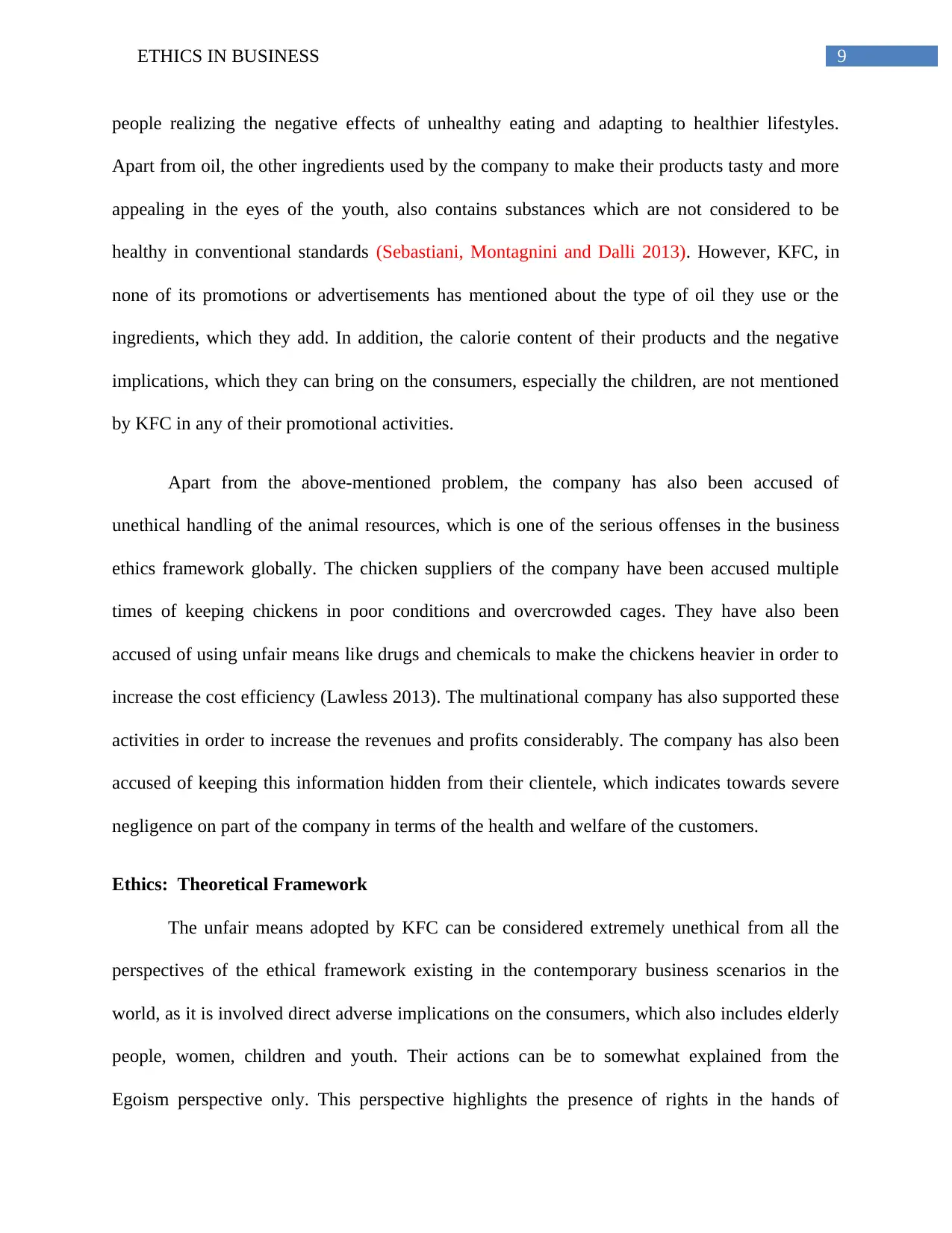
9ETHICS IN BUSINESS
people realizing the negative effects of unhealthy eating and adapting to healthier lifestyles.
Apart from oil, the other ingredients used by the company to make their products tasty and more
appealing in the eyes of the youth, also contains substances which are not considered to be
healthy in conventional standards (Sebastiani, Montagnini and Dalli 2013). However, KFC, in
none of its promotions or advertisements has mentioned about the type of oil they use or the
ingredients, which they add. In addition, the calorie content of their products and the negative
implications, which they can bring on the consumers, especially the children, are not mentioned
by KFC in any of their promotional activities.
Apart from the above-mentioned problem, the company has also been accused of
unethical handling of the animal resources, which is one of the serious offenses in the business
ethics framework globally. The chicken suppliers of the company have been accused multiple
times of keeping chickens in poor conditions and overcrowded cages. They have also been
accused of using unfair means like drugs and chemicals to make the chickens heavier in order to
increase the cost efficiency (Lawless 2013). The multinational company has also supported these
activities in order to increase the revenues and profits considerably. The company has also been
accused of keeping this information hidden from their clientele, which indicates towards severe
negligence on part of the company in terms of the health and welfare of the customers.
Ethics: Theoretical Framework
The unfair means adopted by KFC can be considered extremely unethical from all the
perspectives of the ethical framework existing in the contemporary business scenarios in the
world, as it is involved direct adverse implications on the consumers, which also includes elderly
people, women, children and youth. Their actions can be to somewhat explained from the
Egoism perspective only. This perspective highlights the presence of rights in the hands of
people realizing the negative effects of unhealthy eating and adapting to healthier lifestyles.
Apart from oil, the other ingredients used by the company to make their products tasty and more
appealing in the eyes of the youth, also contains substances which are not considered to be
healthy in conventional standards (Sebastiani, Montagnini and Dalli 2013). However, KFC, in
none of its promotions or advertisements has mentioned about the type of oil they use or the
ingredients, which they add. In addition, the calorie content of their products and the negative
implications, which they can bring on the consumers, especially the children, are not mentioned
by KFC in any of their promotional activities.
Apart from the above-mentioned problem, the company has also been accused of
unethical handling of the animal resources, which is one of the serious offenses in the business
ethics framework globally. The chicken suppliers of the company have been accused multiple
times of keeping chickens in poor conditions and overcrowded cages. They have also been
accused of using unfair means like drugs and chemicals to make the chickens heavier in order to
increase the cost efficiency (Lawless 2013). The multinational company has also supported these
activities in order to increase the revenues and profits considerably. The company has also been
accused of keeping this information hidden from their clientele, which indicates towards severe
negligence on part of the company in terms of the health and welfare of the customers.
Ethics: Theoretical Framework
The unfair means adopted by KFC can be considered extremely unethical from all the
perspectives of the ethical framework existing in the contemporary business scenarios in the
world, as it is involved direct adverse implications on the consumers, which also includes elderly
people, women, children and youth. Their actions can be to somewhat explained from the
Egoism perspective only. This perspective highlights the presence of rights in the hands of
Paraphrase This Document
Need a fresh take? Get an instant paraphrase of this document with our AI Paraphraser
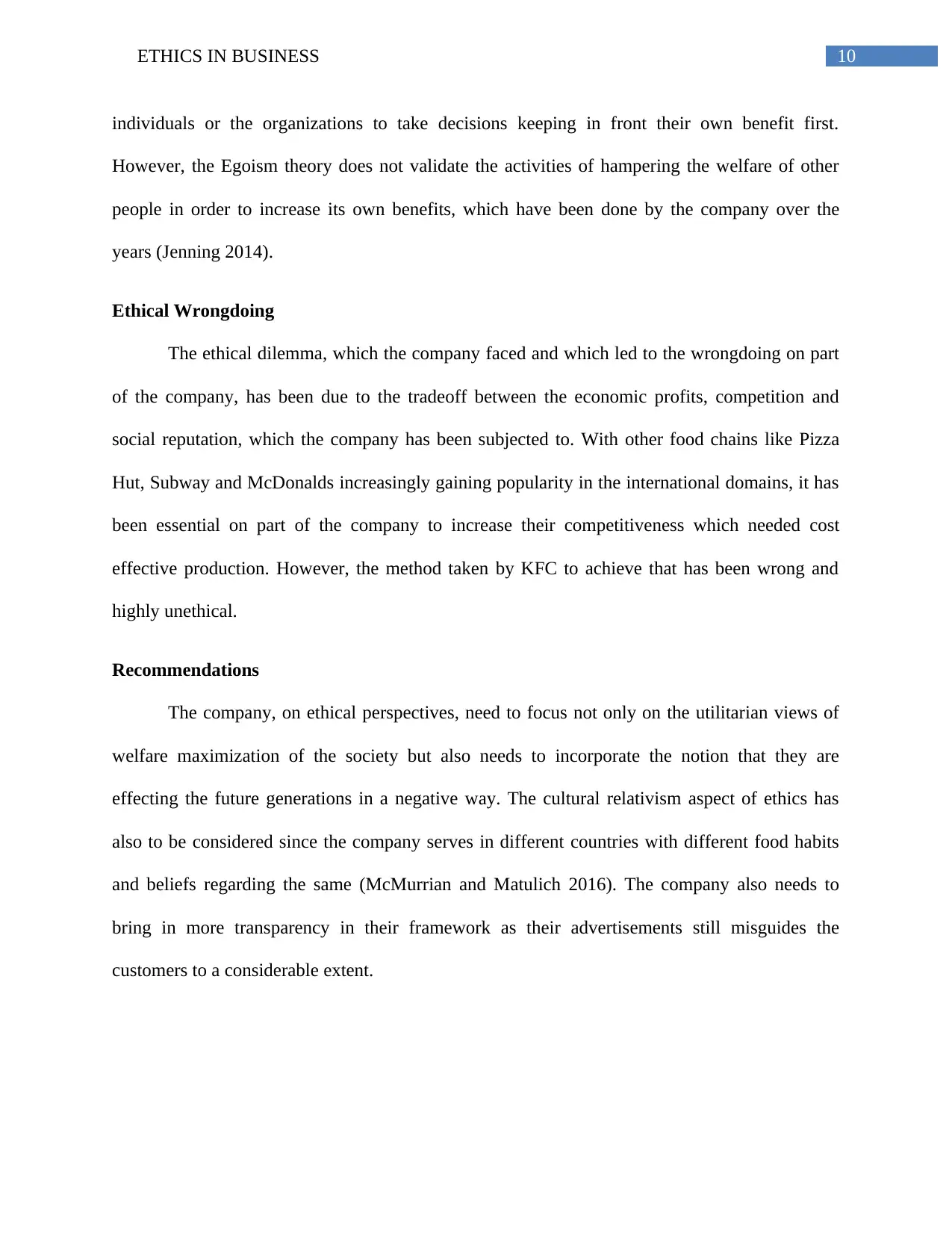
10ETHICS IN BUSINESS
individuals or the organizations to take decisions keeping in front their own benefit first.
However, the Egoism theory does not validate the activities of hampering the welfare of other
people in order to increase its own benefits, which have been done by the company over the
years (Jenning 2014).
Ethical Wrongdoing
The ethical dilemma, which the company faced and which led to the wrongdoing on part
of the company, has been due to the tradeoff between the economic profits, competition and
social reputation, which the company has been subjected to. With other food chains like Pizza
Hut, Subway and McDonalds increasingly gaining popularity in the international domains, it has
been essential on part of the company to increase their competitiveness which needed cost
effective production. However, the method taken by KFC to achieve that has been wrong and
highly unethical.
Recommendations
The company, on ethical perspectives, need to focus not only on the utilitarian views of
welfare maximization of the society but also needs to incorporate the notion that they are
effecting the future generations in a negative way. The cultural relativism aspect of ethics has
also to be considered since the company serves in different countries with different food habits
and beliefs regarding the same (McMurrian and Matulich 2016). The company also needs to
bring in more transparency in their framework as their advertisements still misguides the
customers to a considerable extent.
individuals or the organizations to take decisions keeping in front their own benefit first.
However, the Egoism theory does not validate the activities of hampering the welfare of other
people in order to increase its own benefits, which have been done by the company over the
years (Jenning 2014).
Ethical Wrongdoing
The ethical dilemma, which the company faced and which led to the wrongdoing on part
of the company, has been due to the tradeoff between the economic profits, competition and
social reputation, which the company has been subjected to. With other food chains like Pizza
Hut, Subway and McDonalds increasingly gaining popularity in the international domains, it has
been essential on part of the company to increase their competitiveness which needed cost
effective production. However, the method taken by KFC to achieve that has been wrong and
highly unethical.
Recommendations
The company, on ethical perspectives, need to focus not only on the utilitarian views of
welfare maximization of the society but also needs to incorporate the notion that they are
effecting the future generations in a negative way. The cultural relativism aspect of ethics has
also to be considered since the company serves in different countries with different food habits
and beliefs regarding the same (McMurrian and Matulich 2016). The company also needs to
bring in more transparency in their framework as their advertisements still misguides the
customers to a considerable extent.
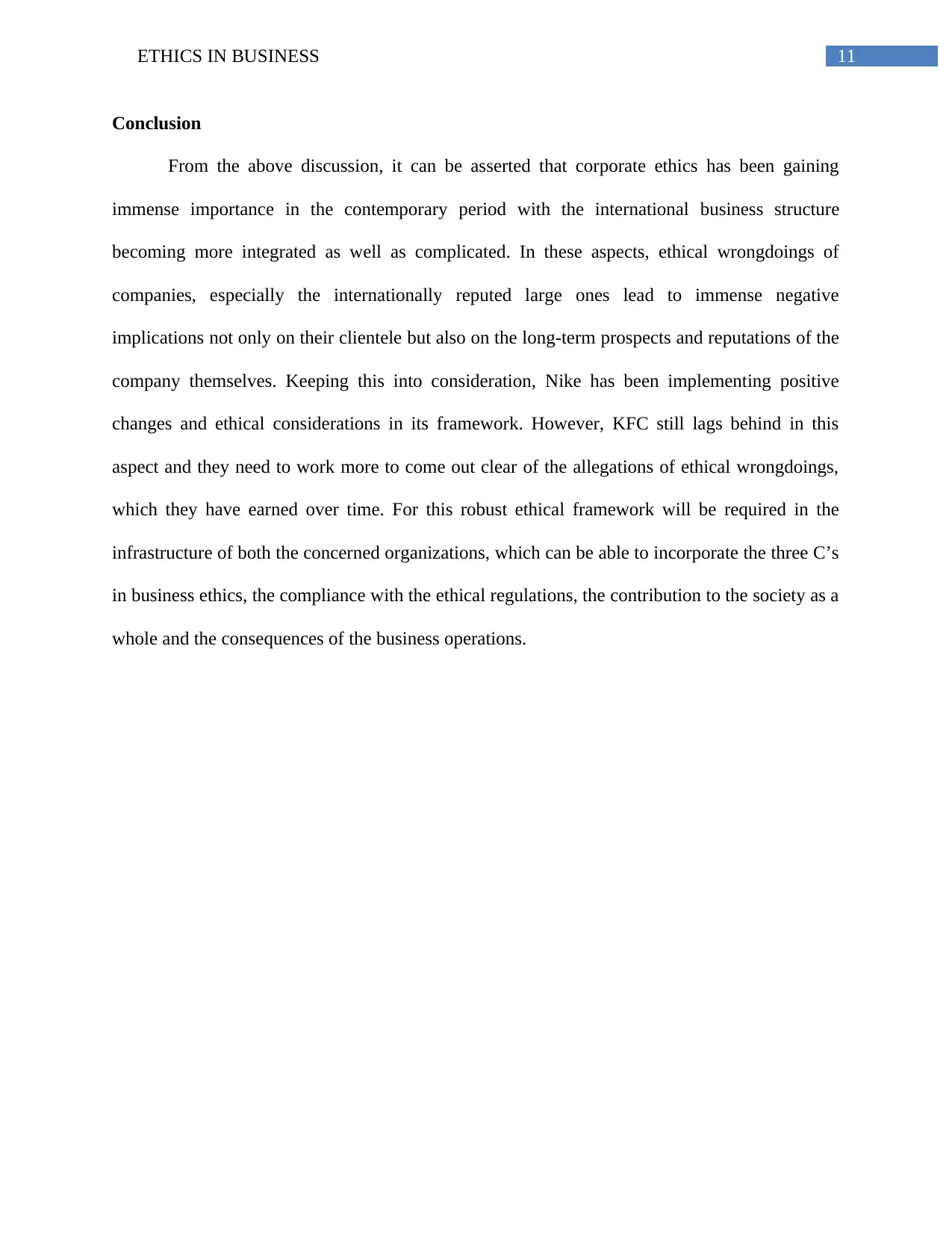
11ETHICS IN BUSINESS
Conclusion
From the above discussion, it can be asserted that corporate ethics has been gaining
immense importance in the contemporary period with the international business structure
becoming more integrated as well as complicated. In these aspects, ethical wrongdoings of
companies, especially the internationally reputed large ones lead to immense negative
implications not only on their clientele but also on the long-term prospects and reputations of the
company themselves. Keeping this into consideration, Nike has been implementing positive
changes and ethical considerations in its framework. However, KFC still lags behind in this
aspect and they need to work more to come out clear of the allegations of ethical wrongdoings,
which they have earned over time. For this robust ethical framework will be required in the
infrastructure of both the concerned organizations, which can be able to incorporate the three C’s
in business ethics, the compliance with the ethical regulations, the contribution to the society as a
whole and the consequences of the business operations.
Conclusion
From the above discussion, it can be asserted that corporate ethics has been gaining
immense importance in the contemporary period with the international business structure
becoming more integrated as well as complicated. In these aspects, ethical wrongdoings of
companies, especially the internationally reputed large ones lead to immense negative
implications not only on their clientele but also on the long-term prospects and reputations of the
company themselves. Keeping this into consideration, Nike has been implementing positive
changes and ethical considerations in its framework. However, KFC still lags behind in this
aspect and they need to work more to come out clear of the allegations of ethical wrongdoings,
which they have earned over time. For this robust ethical framework will be required in the
infrastructure of both the concerned organizations, which can be able to incorporate the three C’s
in business ethics, the compliance with the ethical regulations, the contribution to the society as a
whole and the consequences of the business operations.
⊘ This is a preview!⊘
Do you want full access?
Subscribe today to unlock all pages.

Trusted by 1+ million students worldwide
1 out of 14
Related Documents
Your All-in-One AI-Powered Toolkit for Academic Success.
+13062052269
info@desklib.com
Available 24*7 on WhatsApp / Email
![[object Object]](/_next/static/media/star-bottom.7253800d.svg)
Unlock your academic potential
Copyright © 2020–2025 A2Z Services. All Rights Reserved. Developed and managed by ZUCOL.



